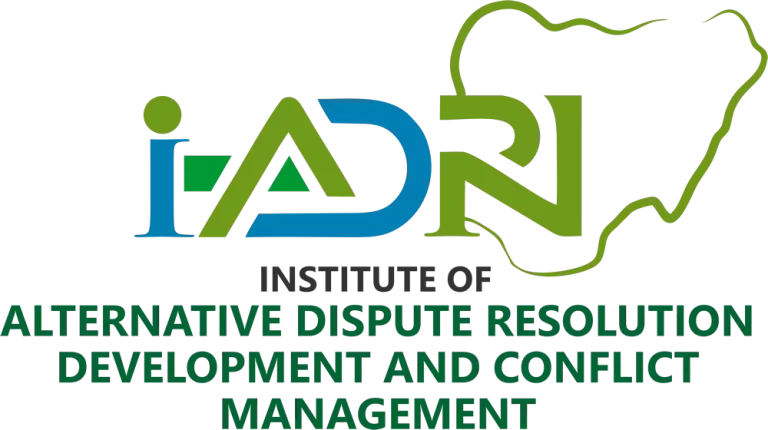Protocol
I feel greatly honoured for the invitation extended to me to speak to this gathering of highly respected and distinguished jurists, and personalities. This is an occasion for the inauguration of the Institute for Alternative Dispute Resolution Development and Conflict Management of Nigeria (i.ADRI), as well as accreditation of its foundation council. The Institute has of course been duly registered as a company limited by guarantee under Nigerian law.
I am particularly grateful to my former dean and highly respected retired but not tired Professor, Akin Ibidapo-Obe, the foundation president of the Institute, for assigning me this humbling task.
The Registrar introduced the mission of this institute in her speech. According to her, “the Institute will teach the procedure and skills of resolving all forms of conflicts and disputes with the use of Alternative Dispute Resolution Mechanisms—Negotiation, Mediation, Arbitration, and other hybrid methods; develop ADR processes which will suit Nigerian Social circumstances; and call up our traditional and communal dispute resolution and conflict management skills which had ensured our peaceful and progressive coexistence in time past.”
Alternative dispute resolution refers to any methods used to resolve a dispute between parties without resorting to litigation. Whilst extant and conventional practice limits the disputes that may be resolved through ADR, we can see that she mentioned “all forms of conflicts and disputes” as being the focus of the Institute. This has the potential to make the Institute unique. Existing institutes or bodies concentrate on commercial and investment disputes, for which conventional ADR methods have been established.
It is also gratifying that the Institute will teach other hybrid methods, for example, customary law arbitration.
Legal Historians and Jurisprudents teach that what we call ADR today is the oldest way of resolving disputes, pre-dating Greco-Roman Civilization. Africa in particular is reputed to be one of the places where the practice of conciliating as opposed to litigating originated from, even though some of the original African methods have not been considered in the modern resurgence of ADR.
It is therefore a delight that some intellectuals have attempted to revisit and utilize our history of devising non-combative approaches to dispute resolution to ensure for us a regime of non-rancorous and peaceful conciliation of all manners of disputes.
It has been said that ADR may not be suitable for resolving certain types of disputes, such as:
- Where there is a need to establish a clear precedent or public ruling.
- Where there is an excessive power imbalance.
- Where the parties are not committed to negotiating and resolving the dispute.
- Where negotiation may be perceived as a sign of weakness.
- Where the parties cannot trust each other to abide by the terms of a settlement.
(World Bank Group, 2011, pp. 5, 18).
But these exceptions fly in the face of the reality in modern time of the following:
- The public may have to choose between overburdening public institutions and lessening their burdens and getting speedy results (case of plea bargain, recovery, etc).
- Power imbalance affects litigation too, if not more than ADR (case of international investment disputes).
- In most commercial and/or civil disputes, parties are usually more interested in moving forward instead of proving a point. Businessmen prefer jurisprudence of interest to jurisprudence of concept.
- In litigation too, the plaintiff only approaches the court if he cannot help himself. Litigants will, if they can, for example, prefer to be a defendant in possession of, say, a landed property. Plaintiffs usually approach courts to preserve or secure an immediate advantage (through ex parte injunctive reliefs, discovery orders, etc). So, invariably, even litigating is a sign of weakness. We hear the powerful tell the weak, “go to court, if you are not satisfied.”
So whether it is litigation or ADR that he resorts to, the weaker party is always at a disadvantage. On the other hand, when a people imbibe the culture of reconciling instead of litigating, a different mindset—that of being contributors to peaceful coexistence instead of being egoists pursuing self-interest at the detriment of peace, justice, and tranquility of the society—would have been acquired that benefits the weak while earning the strong respect and honour.
- The cost of executing court judgments is also expensive, and even after judgment, a recalcitrant judgment debtor can be a pain in the neck of a judgment creditor. A party who will not fulfil his obligation under a negotiated settlement is not likely to make it easy for a judgment creditor to execute judgment against him.
We have seen many important cases being finally settled by political or other solutions after the highest court of the land has delivered a judgment. What is the benefit of first travelling the route of litigation only to embrace the opportunity to reconcile that was available at the time of commencing litigation?
It is indeed my thesis that there is no civil dispute that cannot be better and less rancorously settled through ADR than through the courts, provided the proper ADR method is identified.
In recent times, legal systems, Nigeria inclusive, have come to the realization that ADR is of critical importance both as a substitute or supplement to litigation. In Nigeria, we have witnessed mandatory and discretionary recourse to ADR as part of the procedure or process for litigation. For example, the Lagos State (Civil Procedure) Rules 2019 require that matters filed in court have to go through ADR screening before being assigned to a judge.
The Pre-Action Protocol bundle is now a conditionality for accepting from litigants originating processes in Lagos State. The Registrar must be satisfied that decent efforts have been made to reconcile before recourse is made to litigation. Even after originating processes have been filed and during pre-trial, courts may decide to refer civil disputes to arbitration through the Multi-Door Courthouse, a practice replicated by the Judiciaries in FCT, Abuja, Edo, and some other states.
The Administration of Criminal Justice Act (ACJA) contains a legal framework for the adoption of plea bargaining in Nigeria. Contrary to the hitherto blanket exclusion of criminal law or prosecution from ADR, a new realization, beyond conceptual distinction, that even though the state is the one prosecuting criminal offenders, there are individual victims of crimes whose interests can be better pursued through ADR.
Also, there are human prosecutors with prosecutorial discretion, the exercise of which can be better done through ADR for the benefit of the state. Plea bargain, also known as plea agreement, although not expressly stated to be an ADR mechanism, is regarded as such because its form and effects conform to the principles and aims of ADR.
Conclusively, the establishment of this Institute cannot be done at a better time than now. Legal Practitioners, students of law, the business community, and the generality of the Nigerian populace stand to benefit from this attempt to harness our past and history to direct our future in the area of dispute resolution.
I wish the Institute, its foundation council, and prospective members success in pursuing the commendable mission of the Institute.
Professor Hakeem Abimbola Olaniyan, FCArb

